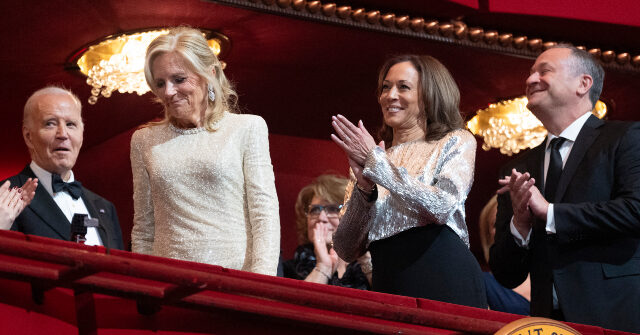The recent behavior of President Joe Biden and First Lady Jill Biden towards Vice President Kamala Harris at a public event reignited discussions about the underlying tensions within the Biden administration. As they entered the Kennedy Center to a standing ovation, the Bidens conspicuously ignored Harris and her husband, Doug Emhoff. This snub was evident in the video footage, where Kamala turned to applaud them, only to be met with complete avoidance of eye contact. The couple’s apparent intent to avoid engagement with Harris was especially striking, as Jill Biden even performed a quick turn away from her. Such behavior not only created an awkward atmosphere but also symbolized the strained dynamics at play within the White House.
Many observers noted the stark contrast between the Bidens’ treatment of Kamala and their interactions with others present at the event. For nearly a minute, Joe and Jill Biden acknowledged various individuals, but pointedly disregarded Harris and Emhoff. Joe’s demeanor, which included looking through Harris to wave at someone else, further emphasized the intentionality behind the Bidens’ disregard. This awkward moment escalated into a palpable tension, underscoring the ongoing discord within the Biden administration and raising questions about the interpersonal relationships in a setting that typically values public appearances and congeniality.
This public display of tension comes on the heels of other notable political events, such as the re-opening of Notre Dame Cathedral in Paris, where Jill Biden appeared to share a friendly rapport with former President Donald Trump. The subtle implications from these events suggest a broader narrative where Jill and Joe Biden may view their relationship with Harris differently than they do with Trump, a figure they have both publicly opposed. The narrative hints at a deep-seated belief among the Bidens that while political games are expected, negotiations and collaborations should always have a trustworthy basis—a principle they seem to believe Kamala Harris violated through her past criticisms and actions.
The context for Joe Biden’s apparent resentments towards his vice president is crucial for understanding the situation. Having won the Democratic primary, he may feel his legacy is compromised by Harris’s actions, which he perceives as politically undermining. Her previous criticisms—accusing him of racism during the campaign—may be lingering disappointments that color his willingness to reconcile with her, especially given her failure to secure a nomination in the subsequent race. The bid for the presidency by Harris underscores the stakes involved in their relationship as political allies—or adversaries, depending on one’s perspective.
Biden’s perspective also includes a sense of betrayal. In his view, his administration was under attack from various fronts, including figures he once trusted, like Harris and Speaker Nancy Pelosi. With Trump rebounding into prominence, Biden likely feels the stinging loss of potential accomplishments and historical legacy brought about by losing the political battle. Thus, any semblance of camaraderie between the Bidens and Harris is overshadowed by the distinct possibility of a looming political realignment that might once again favor Trump. This fracture reflects deeper dissatisfaction that isn’t just personal, but indicative of broader political challenges that the Biden administration faces.
In the aftermath of public confrontations and perceived political betrayals, speculations about future dynamics within the Democratic Party remain high. With elections approaching, internal strife between figures like Biden and Harris could have significant repercussions not only for their administration but for the party’s unity moving forward. The ongoing blue-on-blue recriminations are poised to shift the landscape of American politics, leaving observers wondering if the tensions will resolve or snowball into an electoral liability as they maneuver into the next election cycle. As Biden attempts to solidify his legacy, the tensions within his own administration will invariably complicate matters as he seeks both to reclaim authority and ensure party cohesion in an increasingly polarized political environment.

